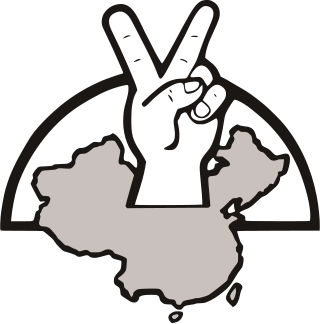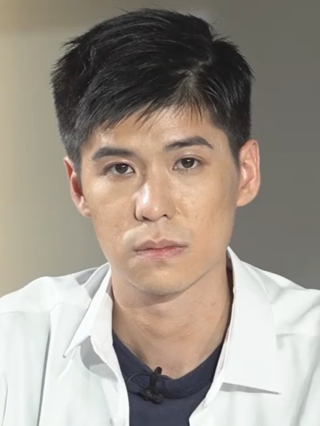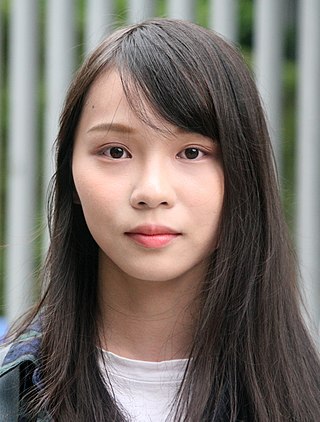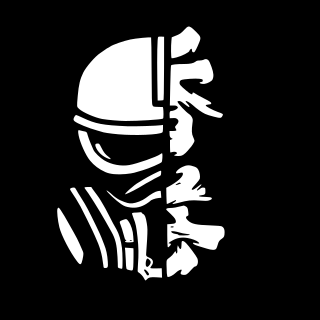
The Hong Kong Alliance in Support of Patriotic Democratic Movements of China was a pro-democracy organisation that was established on 21 May 1989 in the then British colony of Hong Kong during the 1989 Tiananmen Square protests and massacre in Beijing. After the 4 June massacre, the organisation main goals were the rehabilitation of the democracy movement and the accountability for the massacre. The main activities the organisation held were the annual memorials and commemorations, of which the candlelight vigil in Victoria Park was the most attended, reported and discussed event each year. Due to its stance, the Central government in Beijing considers the organisation subversive.

The Civil Human Rights Front (CHRF) was an organisation that focused on the issues of Hong Kong politics and livelihood, affiliated with almost all pan-democratic camps in Hong Kong. It was founded on 13 September 2002 and disbanded on 15 August 2021.

Joshua Wong Chi-fung is a Hong Kong activist and politician. He served as secretary-general of the pro-democracy party Demosisto until it disbanded following the implementation of the Hong Kong national security law on 30 June 2020. Wong was previously convenor and founder of the Hong Kong student activist group Scholarism. Wong first rose to international prominence during the 2014 Hong Kong protests, and his pivotal role in the Umbrella Movement resulted in his inclusion in TIME magazine's Most Influential Teens of 2014 and nomination for its 2014 Person of the Year; he was further called one of the "world's greatest leaders" by Fortune magazine in 2015, and nominated for the Nobel Peace Prize in 2017.

Lester Shum Ngo-fai is a Hong Kong social activist and politician. He was a leader of the 2014 pro-democracy protests in Hong Kong and served as deputy secretary-general of the Hong Kong Federation of Students (HKFS) from April 2014 to March 2015. He was a member of the Tsuen Wan District Council for Hoi Bun from 2020 to 2021.

Nathan Law Kwun-chung is a mainland-Chinese-born activist and politician from Hong Kong. As a former student leader, he has been chairman of the Representative Council of the Lingnan University Students' Union (LUSU), acting president of the LUSU, and secretary-general of the Hong Kong Federation of Students (HKFS). He was one of the student leaders during the 79-day Umbrella Movement in 2014. He is the founding and former chairman of Demosistō, a new political party derived from the 2014 protests.

Agnes Chow Ting is a Hong Kong politician and social activist. She is a former member of the Standing Committee of Demosisto and former spokesperson of Scholarism. Her candidacy for the 2018 Hong Kong Island by-election, supported by the pro-democracy camp, was blocked by authorities, due to her party's advocacy of self-determination and independence for Hong Kong. She was arrested in August 2019, during the 2019–2020 Hong Kong protests, for her role in a protest at police headquarters two months earlier, and sentenced to 10 months in jail in December 2020. She was again arrested for the National Security charge of 'collusion with foreign forces' in August 2020, albeit released on bail the day after. After her early release in June 2021, she made no public announcements until December 2023, when she wrote on social media that she had already moved to Canada in September that year to study for a master's degree at a university in Toronto, and decided to go into exile.

The 2021 Hong Kong Legislative Council election was a general election held on 19 December 2021 for the 7th Legislative Council of Hong Kong. Under the drastic Beijing-imposed electoral overhaul, the total number of seats was increased from 70 to 90 seats, with the directly elected geographical constituencies (GCs) reduced from 35 to 20 seats, the trade-based indirectly elected functional constituencies (FCs) staying at 30, and the additional 40 seats being elected by the 1,500-member Election Committee. therefore still not allowing universal suffrage.

The Hong Kong national security law, officially the Law of the People's Republic of China on Safeguarding National Security in the Hong Kong Special Administrative Region, is a national law of China on Hong Kong national security. It is implemented in Hong Kong in accordance to Hong Kong Basic Law Article 18, which allows for Chinese laws to be valid in Hong Kong if they are included in Annex III. It was formulated under the authorization of the National People's Congress decision on Hong Kong national security legislation. The law was passed on 30 June 2020 by the Standing Committee of the National People's Congress as a means of resolving the anti-extradition bill protests instigated by a Hong Kong local bill proposed in 2019 to enable extradition to other territories including the mainland, and came into force the same day.

The 2020 Hong Kong pro-democracy primaries were held on 11 and 12 July 2020 for selecting the numbers of pro-democracy candidates for the subsequently postponed 2020 Legislative Council election to maximise the chance for the pro-democrats to achieve a majority in the 70-seat Legislative Council.

The 2020 Hong Kong Legislative Council election was originally scheduled on 6 September 2020 until it was postponed by the government. On 31 July 2020, Chief Executive Carrie Lam announced that she was invoking the Emergency Regulations Ordinance to postpone the election under the emergency powers granted to her by it, citing the recent resurgence of the COVID-19 cases, adding that the move was supported by Beijing.

The Hong Kong National Security Law is a piece of national security legislation passed on 30 June 2020 which was a major factor, besides the COVID-19 pandemic and its accompanying gathering regulations, in essentially ending the anti-extradition bill protests. The law established the crimes of secession, subversion, terrorism, and collusion with foreign organisations. Implementation of the law entitles authorities to surveil, detain, search and extradite persons suspected under its provisions to Mainland China.

The 32nd anniversary of the 1989 Tiananmen Square protests featured events in China and elsewhere on, and leading up to, 4 June 2021 – to commemorate the 1989 Tiananmen Square protests and massacre, in which the government of China ordered the army to fire on protestors, killing hundreds, if not thousands, of people.

Tonyee Chow Hang-tung is a Hong Kong activist, barrister and politician. During the crackdown by authorities on the Hong Kong Alliance in Support of Patriotic Democratic Movements of China, which began in June 2021 and was mainly based on national security charges over the Alliance's annual vigils in remembrance of the 1989 Tiananmen Square protests and massacre, Chow was cast into the limelight, having become the convenor of the group after the arrest of leaders Lee Cheuk-yan and Albert Ho in April. In December 2021 and January 2022, Chow was convicted respectively for inciting and taking part in an unlawful assembly on occasion of the vigil in 2020, and for organizing the vigil in 2021, and sentenced to a total of 22 months in prison. A trial date for further national security charges against Chow has not been set as of 10 November 2022. By that time, observers considered her to be possibly the most prominent remaining dissident voice in Hong Kong.

A dramatic manifestation of the far reach of the Hong Kong national security law was the mass arrest of 54 pro-democracy activists on 6 January. The arrested stood accused of subverting state power, a crime under the national security law, for their participation as candidates or in other capacities, in the 2020 Hong Kong pro-democracy primaries, which was part of a plan to increase pressure in parliament for democratic reform. Most of them were released on bail the following day. For the first time, the National Security Department of the police cited the national security law to block the website of HKChronicles. There were also several convictions in relation to the 2019-2020 Hong Kong protests.

On 22 February 2021, Xia Baolong, director of the Hong Kong and Macau Affairs Office, proposed that Hong Kong's governance had to be in the hands of "patriots". Observers considered it possible that the definition of "patriot" would require candidates for public office to embrace the rule of the Chinese Communist Party, as also suggested by Hong Kong Secretary for Constitutional and Mainland Affairs Erick Tsang; and that this signified a departure from the position that had prevailed since a speech by China's paramount leader Deng Xiaoping in 1984.

After the 1 July police stabbing, Hong Kong police and the government characterized the incident as a "lone wolf" terrorist attack. Foreign media saw the stabbing as a sign of a steep decline of the reputation of the police in the eyes of some locals, a process that had begun with the 2019–2020 Hong Kong protests. They also considered the uncovering of a bomb plot on 5 July as evidence of a polarization in society, and pointed to the influence of diminishing legal ways to voice dissent in the year since the national security law came into effect. At the beginning of the month, the police arrested citizens who posted on the Internet for inciting others to kill the police. Later it persecuted members of the student union of Hong Kong University for having passed a motion, subsequently withdrawn, that had praised the "sacrifice" of the deceased attacker of 1 July.

Two organizations considered to have been central to Hong Kong civil society, the Hong Kong Professional Teachers' Union and the Civil Human Rights Front (CHRF), disbanded this month. Both cited an inability to go forward in the changed atmosphere in the city created by the national security law. Chief Executive Carrie Lam dismissed concerns that the disbandment of the CHRF heralded a loss of freedom in the city, saying that many of the city's civil groups and individuals had "wilfully touched these red lines in the past", and that freedoms enshrined in the Hong Kong Basic Law may have to give way to goals such as national security, public hygiene, or public morals.

Student Politicism was a student political group in Hong Kong. Founded on 26 May 2020, the group was one of only few pro-democracy organisations still existing in Hong Kong as of September 2021, before it was dissolved on 24 September 2021 after core members were charged under the National Security Law.

Returning Valiant was a pro-independence group in Hong Kong. Formed mainly by students under the Hong Kong national security law in 2020, the group called for continuation of protests to "liberate the city".















